What it takes to be a Demeter Certified Biodynamic® vineyard
When we began our journey at Eco Terreno, we quickly learned how to best farm our vineyards. Farm to regenerate the earth, rather than degenerate the soil, our immediate environment, and the planet.
To do it right, we held ourselves to the highest standards, as established by Demeter. Considered the gold-standard for quality control in Biodynamic® farming, we received certification in June, 2017.
What is Biodynamic farming?
Biodynamic farming is a comprehensive, ethical, ecological, circle-of-life approach to farming for natural abundance and vitality.
The Biodynamic Association explains, “Each Biodynamic farm or garden is an integrated, whole, living organism. This organism is made up of many interdependent elements: fields, forests, plants, animals, soils, compost, people, and the spirit of the place.”
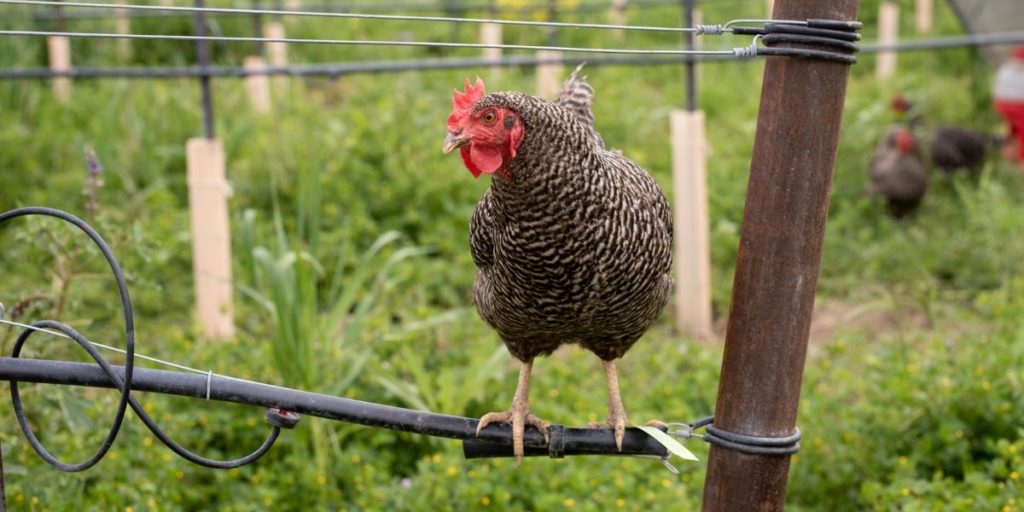
Biodynamic farming relies on the farm’s entire ecosystem to work in collaboration to foster a self-sustaining, nourishing, naturally flourishing environment. We achieve this without the use of chemicals or pesticides and with minimal use of outside materials.
Our role as Biodynamic farmers
So where do we, as people and a winery, fit into the Biodynamic farming paradigm at Eco Terreno?
As part of this living organism that is Biodynamic farming, we contribute as stewards, gently and holistically. By maintaining balance between all the elements, we thrive together, in symbiotic harmony.
Helping foster the success of all these elements takes more time and effort than modern industrial farming. But once the soil and ecosystem are in balance, they’re more self-sustaining, self-regulating, and healthy for years to come.
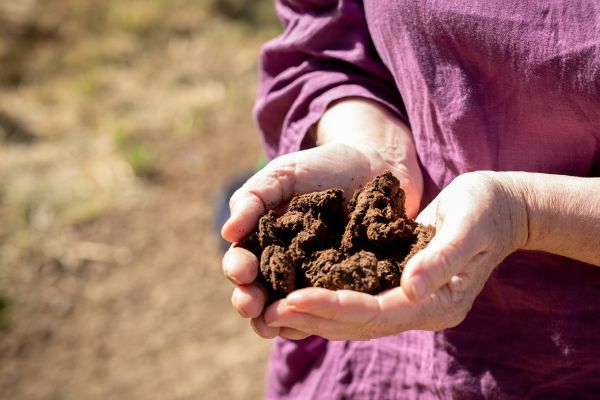
What is Biodynamic farming?
At the heart of a Biodynamic farm is its soil. From spectacularly fertile, healthy soil, all living things including plants, animals, and humans can thrive. To accomplish this, we farm according to the main principles of Biodynamic farming:
- plant diversity
- crop rotation
- diverse animal life
- composting
- homeopathic solutions/preparations
- life forces
Let’s briefly break them down:
Plant diversity
As evidence supports, monoculture farming, or growing one type of crop on the same plot of land, strips the soil of its nutrients. This destructive practice creates a less-than-favorable environment for plants.
The healthier alternative is plant diversity. Growing a variety of symbiotic plants together has proven to promote soil health, increase crop yield, welcome life-perpetuating pollinators, and suppress weeds and pests.
At Eco Terreno, we plant seasonal cover crops in our vineyards, maintain the perennial hedgerows surrounding the vineyard, cultivate seasonal vegetable and herb gardens, and maintain a large swath of pristine wilderness to help keep our environment in balance through diversity. We also have a bountiful fruit orchard and a bee garden that attracts many buzzing, pollinating friends. With plant life flourishing year-round, the land is literally alive with vitality.
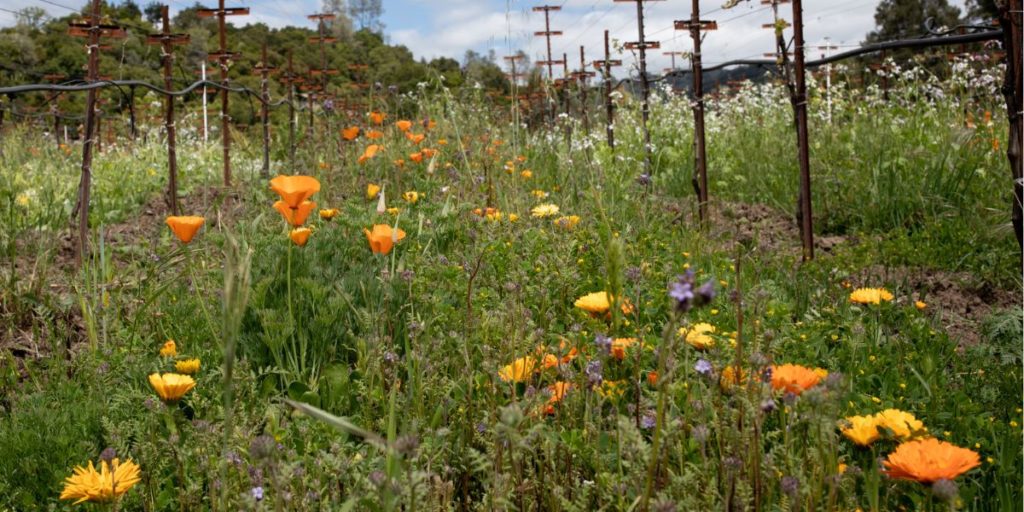
Crop rotation
Planting a rotating roster of plants on any given patch of land fosters soil health and fertility. It also aids in reducing erosion and enables more nutrient availability in the soil to assist the growing plants. We rotate a wide variety of cover crops in our vineyards, and fruits and vegetables in our edible gardens. Together they nourish the soil and support our birds, bees, and beneficial insects, all important contributors to our farm. By viewing the farm as a whole system, we essentially run it so it can run itself. Able to generate its own resources and provide for its own energy needs within, keeps it healthy. This is all par for the course of Biodynamic farming. Another word to describe this closed loop farming system is permaculture (a combination of the words ‘permanent’ and ‘agriculture’). Philosophically speaking, we are turning waste into resources.
Animal life
Not all animals are ideal for vineyard and garden health. However, many play critical roles in bolstering soil nutrients, managing weeds, deterring pests, and pollinating local flora.
By offering bird boxes and perches, we actively create a hospitable environment for helpful birds, including bluebirds and raptors. In addition, we leave 15 percent of our land wild, as a natural habitat for birds and other local wildlife. During winter, we welcome sheep to the vineyards to do what they do—naturally till, weed, and fertilize the soil. And chickens and Indian running ducks roam our grounds, gobbling up bugs and fertilizing the ground as they go.
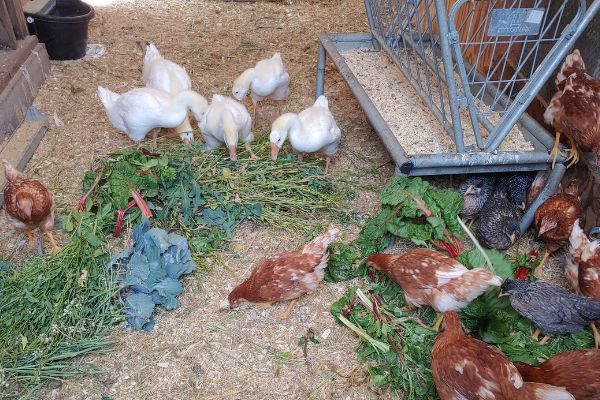
Composting
We wholeheartedly embrace composting at Eco Terreno. Through the regular application of recycled matter, we fertilize our soil naturally with powerful, enriching nutrients. Along with organic cow manure and organic straw, we add organic plant waste from our edible garden and vineyard pomace (grape skins, seeds and stems left over from winemaking) to our estate-made Biodynamic compost. Less waste, better compost. It’s a win-win!
And the benefits go beyond our own farm. By not using synthetic or chemical fertilizers, we also contribute to the health of our surrounding environment and the greater planet.
Homeopathic solutions
“Homeopathic solutions” is a term used to describe concoctions made from organic herbs, mineral substances, manure, and other organic ingredients. These solutions are used on the farm for natural medicinal or nutritional purposes.
Biodynamic certification requires the application of nine such preparations on the farm. Their purpose is to strengthen the health and vitality of our soil and plants. All of these homeopathic preparations are added to our compost. Some are sprayed directly on the vines. With their assistance and growing benefits we are able to avoid using pharmaceutical-like/chemical-based treatments on our farm.
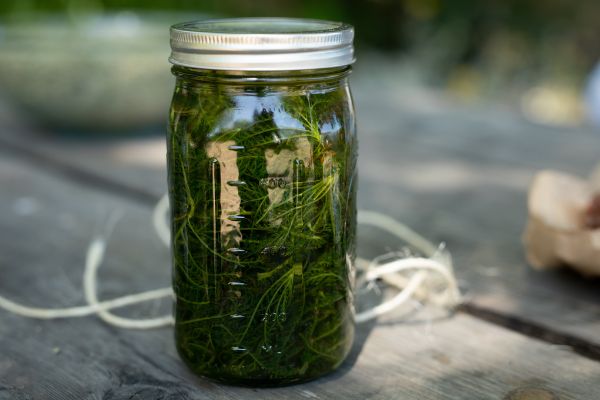
Life forces
Integrating life forces into farming practices is the respect and understanding of working with, and tapping into, the rhythmic seasons, moon phases and celestial cycles of our wise and giving Mother Nature. It’s where science meets cosmic spirituality. Working with the natural rhythm of plants and vines is an important part of Biodynamic farming.
What it takes to become certified
Demeter’s Biodynamic farm standards are far more detailed than what we’ve outlined above.
For any farm to achieve Biodynamic certification, it must develop a specific farm system that:
- fosters fertility
- naturally controls pests and weeds
- organically transforms waste from one part of the farm into energy for another
- and elevates the earth’s natural resources rather than mining them.
The elements of the system must originate from the farm itself. It builds a healthy working relationship between soil, crops, animals, compost, and botanical and species diversity.
You can read all the requirements for Biodynamic certification here. You’ll find an extensive list of nuances that must be adhered to, from 100-percent organic farming practices to avoiding bare-tilling the land to extensive water conservation.
As stewards with an intimate relationship and understanding of our farm, it’s obvious to us that each and every one of these requirements is essential to the health of our farm and its inhabitants.
How Biodynamic farming affects wine quality
Even before we received our Biodynamic certification, we saw great reward in our wines. Not surprisingly, an idyllic vital growing environment produces wines that express sublime character and an authentic sense of terroir.
With nutrient-rich soils, minimal irrigation to keep our vines healthy without diluting the flavor, and no disruption of chemicals, our wine exhibits uniquely pure flavors, rich minerality, and the fullest expression of our distinct surroundings. Each of our wines is essentially a reflection of paradise.
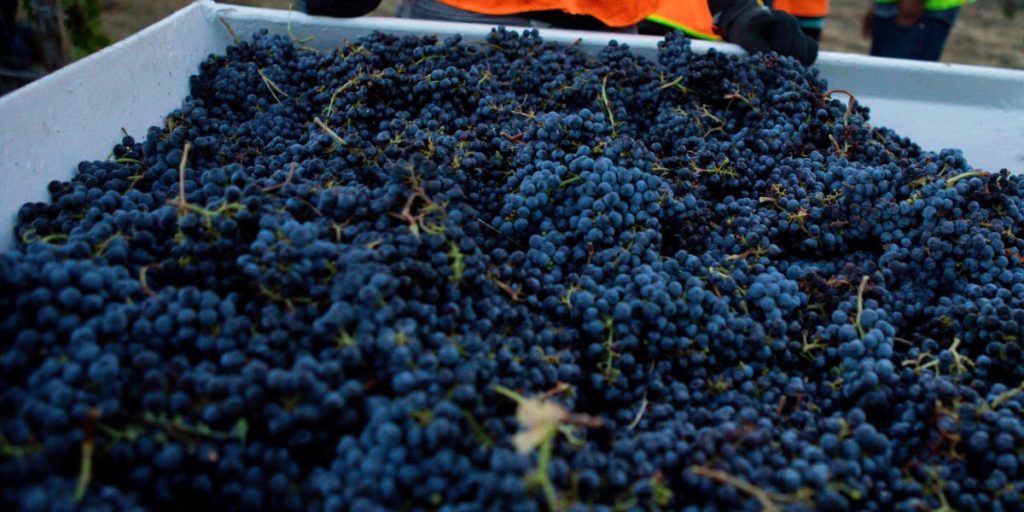
The broader impact of Biodynamic farming
But it’s not just our farm and wines that benefit.
Biodynamic farming triggers carbon sequestration, where plants and soil naturally remove and store carbon emissions from the atmosphere. The impact is measured on a mighty scale – the reduction of global warming!
Imagine how much better off our world would be if we all followed Biodynamic farming. We’ll share ideas on how you can easily participate at the end of this article.
At Eco Terreno, helping create a positive, restorative influence on our farm and the environment is as important as making our superior wines. And the more we experience the living paradise that is a Biodynamic farm, the more we feel it is our responsibility to champion regenerative agriculture. Being leaders in this positive movement brings joy to our hearts and happiness to our workplace.
How to grow your own Biodynamic garden
As we explained, there are six main principles to Biodynamic farming. We practice each of these on our wine farm at a large scale, but so can you at home, on your own scale.
Let’s cover each principle, with practical tips you can easily follow.
Plant diversity
Plant with the seasons and you’ll automatically be creating a garden of diversity. Take this a step further and plant by the Biodynamic calendar. The Demeter Association recommends the Maria Thun Biodynamic planting calendar. Maria devoted her life to the cosmic influences on agriculture, creating the Biodynamic calendar in 1962, still in use today.
Crop rotation
Rotating the location of your plants is as important in your own garden as it is on a big farm. It has the same effect of controlling pests, plant diseases, and increasing soil fertility. For example, if your tomatoes were impacted by a particular pest, plant them in a new location the next season. Maybe switch the lettuce spot with the tomato spot. As pests and diseases have a habit of building up over time, rotating your crops like this will break the cycle. And crop rotation improves soil fertility. Plants have their own individual nutritional needs which they absorb from the soil they are in. Plant the same type in that soil time and time again, and eventually those nutrients will be depleted. Plant something different in that location and you will put a stop to this gradual degradation.
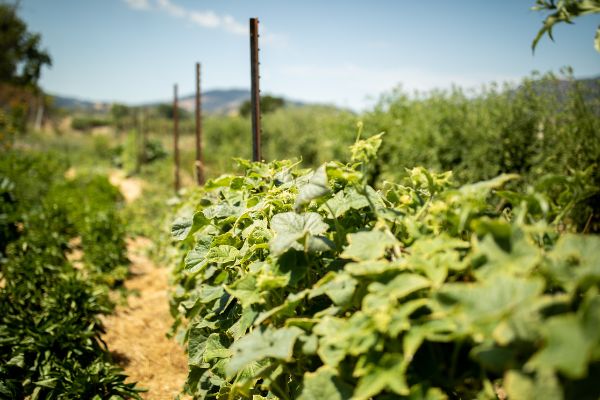
Here’s a simple rule to follow.
If you have multiple garden beds, switch the plants from garden bed one to garden bed two in the following season. Or if you only have one garden you can change seasonally, mix up the plants you choose to grow. There is a wide selection of plants available for the home gardener, be they vegetables, herbs, and fruits. Try planting something new each season, for the sake of your garden and your own well-being. Your health will reap the benefits of a diversity of plants too! For an extensive resource on what to plant when, refer to the Urban Farmer Guide.
Diverse animal life
City gardens now contribute the same, if not more, to animal biodiversity in our environment. Your own backyard chickens would be great, but who was the space or the time to care for them. How else can you increase the animal life at your home? By planting wildlife friendly plants. Bring benefits to your own garden, as well as the surrounding environment, by growing plants attractive to pollinators. Pollinators include bees, butterflies, beetles, birds, bats (all the b words…), moths, flies, and other small mammals. To help elevate the importance of protecting our pollinator population, Eco Terreno joined the Bee Friendly Farming (BFF) program. They are a great resource for farms our size, and home gardeners too. For an extensive list of plants you can grow in your zipcode, refer to their handy planting guide.
For a quick list of herbs pollinators love, we recommend – rosemary, oregano, basil, dill, and parsley. And an all-time favorite flower, lavender.
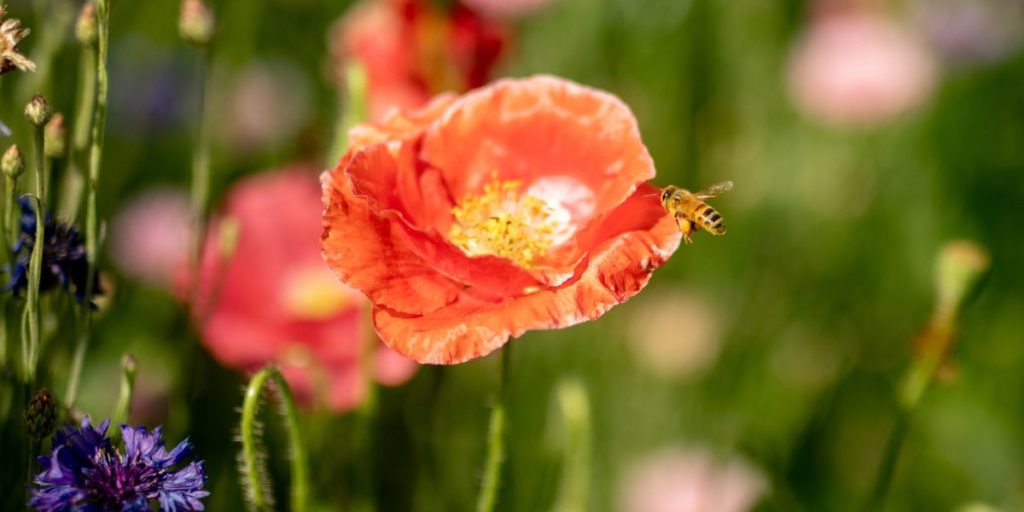
Composting
We live the daily reality of a healthy soil equals a healthy farm. For our thoughts on soil health read our previous post on its importance to the overall health of a farm. With soil health being so critical, the easiest way to increase your soil’s nutrient levels is by adding compost. Vermicomposting, otherwise known as worm composting, gives you the greatest bang for your buck, especially if you live in a city where space is limited. And as an added bonus, it’s affordable to set up your own vermicompost bins. The EPA provides easy to follow instructions on how to create a worm farm, even indoors.
We can’t recommend the value of composting enough. It will transform your garden and is a preferable solution to food waste. Put your waste to work.
Homeopathic solutions and preparations
There are nine Biodynamic preparations (homeopathic solutions) all of which we use on our farm, particularly in our compost. Unless you have access to cow horns and oak bark, it might be a better use of your time to purchase ready made solutions from trusted sources. Demeter recommends the Josephine Porter Institute. Try their Compost Starter, a favorite of the home gardener.
Life forces
This principle is applied through mindful practices. If you work in tune with the rhythms of nature’s seasons, you are operating with a life forces mindset. By practicing the other principles, you’re automatically applying the concept of life forces into practice as well. Harmony with nature will happen organically as a result.
For more on the principles and organizations creating a better environment from the ground up, check out these resources.
Pollinator.org – protecting and nurturing our pollinators especially the bees
Real Organic Project – farmer-led movement to raise awareness of soil-grown and pasture-raised product
Kiss The Ground – dedicated to improving soil health the world over
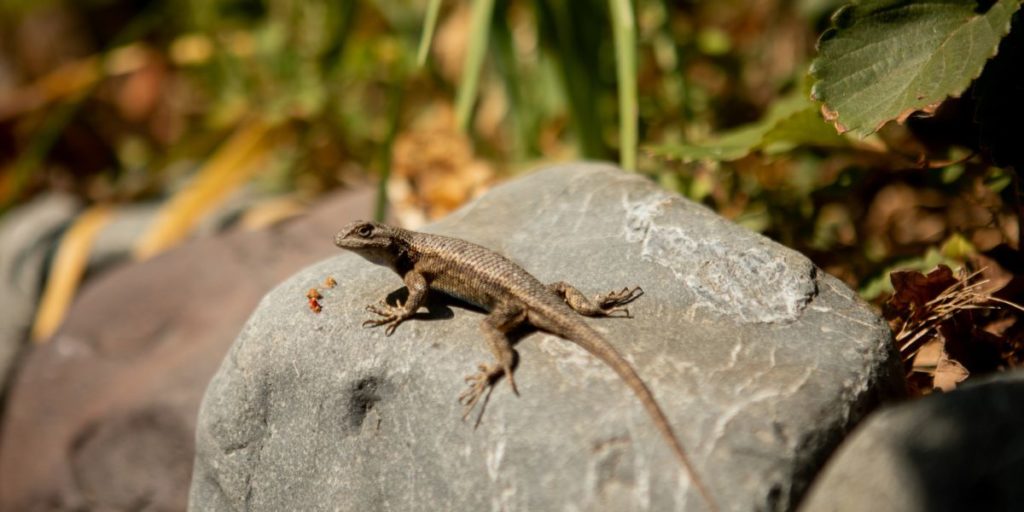
Join The Buzz – our mailing list with seasonal news from the vineyard and tips from our experts on living a more eco-friendly life.
